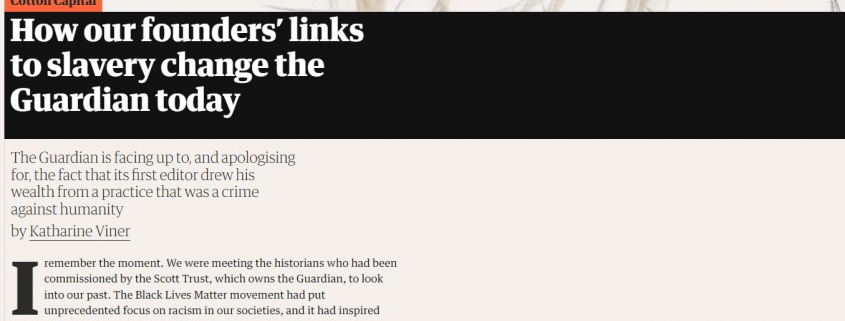The Guardian’s apology for its slavery links is a performance
James Heartfield
The campaigning liberal newspaper has ‘discovered’ its links to slavery, and issued an overwrought apology. Why?
Editor Kath Viner has apologised for the Guardian newspaper’s links to slavery, and the Scott Trust, which owns the paper, has promised £10million towards ‘restorative justice’ and to expand its bursary scheme for training black journalists.
On closer inspection, the revelation of the links to slavery of what was then called the Manchester Guardian do not seem quite as remarkable as the editor’s statement says. Cotton merchant John Edward Taylor got 11 subscribers to put up the money to launch his newspaper in 1823. One of them, Sir George Philips, had a partner who owned slaves on the Hanover Plantation in Jamaica. As debts to slavery go among the Georgian elite, these are not exactly damning.
Today’s hand-wringing editor goes on to point out that Taylor himself, as a trader in woven cotton, bought slave-grown cotton from the West Indies. That would hardly be surprising, since Britain’s cotton-mill owners bought almost all the cotton that was grown in the Americas to weave into cotton cloth for sale in Britain and for export, right up until the end of slavery in the United States in 1865.
If today’s Guardian, writers wanted to find a link to slavery, they could find a much starker one in the newspaper’s strident defence of the Confederate secession, the ‘slave-owners’ revolt’ of 1861. Then, the Manchester Guardian’s pro-secession editorial stance was so offensive to anti-slavery campaigners that they organised a massive protest outside the newspaper’s Manchester offices on New Year’s Eve 1863.
Reading the Guardian’s contemporary coverage of the question of slavery’s heritage, it is not hard to see why the paper is defensive about its past, even if the actual sins are slight. The paper today is full of articles pointing out the ties that Britain’s other institutions, from her ancient universities to the Bank of England, have to slavery. Having pointed a condemnatory finger at so many, the newspaper itself was always in danger of inviting criticism along the same lines – and who is not secretly thrilled at exposing hypocrisy among the high-minded?
The Guardian newspaper has often set itself up as a righteous shield against injustice. In 2007, reflecting on 150,000 editions of the paper, then editor Alan Rusbridger trumpeted that the paper was the true inheritor of the cause of the radical reformers at Peterloo, steeped in the campaign for justice. (It is a claim that, even as she apologises for an investor’s links to slavery, Kath Viner repeats.) In fact, the paper’s founder John Edward Taylor was a strident opponent of the reformers who were cut down in the Peterloo Massacre, writing at the time that:
They have appealed not to the reason but to the passions and the suffering of their abused and credulous fellow-countrymen, from whose ill-requited industry they extort for themselves the means of a plentiful and comfortable existence.[i]
Taylor set up the Manchester Guardian to take advantage of the government suppression of another paper, the Manchester Observer, which did support the reform campaigners. In its prospectus, the Manchester Guardian promised to promote the ‘just principles of Political Economy’. The intended readership was ‘amongst the classes to whom, more especially, Advertisements are generally addressed’. Such people would value ‘the commercial connections and knowledge of the conductors of the Guardian’.[ii] Another radical paper, the Manchester and Salford Advertiser dubbed the Guardian ‘the foul prostitute and dirty parasite of the worst portion of the mill-owners’.[iii]
The Guardian’s editorial staff might have fancied that their newspaper had always been on the side of the righteous, but for most of its history it was only liberal as far as the rights of the propertied and educated classes were concerned. While it promoted anti-slavery in the British Empire, that did not extend to backing Emancipation in the United States. And though it was at times critical of strident imperialism, it kept its harsher criticisms for those who opposed the British Empire, cursing the leaders of the Easter Rising in Easter 1916, Egypt’s Nasser in 1956 and even Ireland’s Civil Rights protesters in 1971.[iv]
Editor Viner’s hand-wringing today has little to do with the paper’s actual history, but instead is about how the paper places itself today. Ten years ago, The Guardian itself published an article entitled ‘Lincoln’s Great Debt to Manchester’. It tells of the Lancashire mill workers who supported Lincoln’s blockade of slave-picked cotton. Despite their own economic suffering due to the blockade in 1862, the mill hands rejected the Manchester Guardian’s appeal for them to end their support for the blockade. Not all of Britain’s history is the sordid tale of hypocrisy, violence and oppression that David Olusoga and others would have us believe.
One clue as to the grandiose apologies of 2023 is that the paper had already been accused of racism by three producers of its podcast of the in-house investigation of Taylor. The three wrote ‘a key issue was the lack of any serious desire from the Guardian to face and interrogate its own historic role’ as well as having to work:
. . . with execs who had no oversight of the series or subject matter and frequently had to problem-solve and work around the poor leadership and lazy production of our full-time colleagues whilst working part-time.
They went on to allege ‘the irony of dealing with institutional racism, editorial whiteness and ignorance on a project about the legacies of slavery hasn’t been lost on us – and deeply undermines the integrity of the project’.
Whatever the truth of these complaints, they must surely have added to the Guardian editorial team’s defensiveness about their investigation, and perhaps exerted a pressure on the editorial team to interpret and present historical findings in the most sensationalist way.
The descent from the self-aggrandising narrative of the Guardian as champion of the truth to shame-faced and apologetic Guardian, implicated in slavery, is not such a dramatic change as it appears. In both versions, the Guardian’s editors have somewhat narcissistically made themselves centre of the story.
It really should come as no surprise that a business set up by a Manchester cotton merchant in the early nineteenth century would have some connections with slavery. But there is no reason to conclude that the Guardian today owes any debts to the descendants – were those people locatable – of Sir George Phillips’s plantation. The Guardian can apologise for its historic progenitors, and its owners, the Scott Trust, can pay its indulgences. We remain unimpressed. The only real debt any newspaper owes anyone is the one it owes its readers: to tell the truth.
[i] Manchester Gazette, 7 August 1819, quoted in David Ayerst, The Guardian, 1971, p 20
[ii] Ayerst, p. 23-4
[iii] 21 May 1836
[iv] Murray McDonald, 50,000 Editions of the Imperialist, War-Mongering, Hate-Filled Guardian Newspaper, 2007

